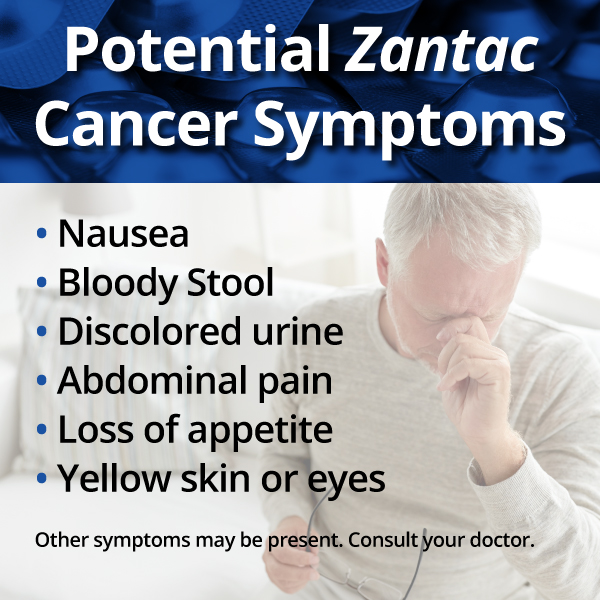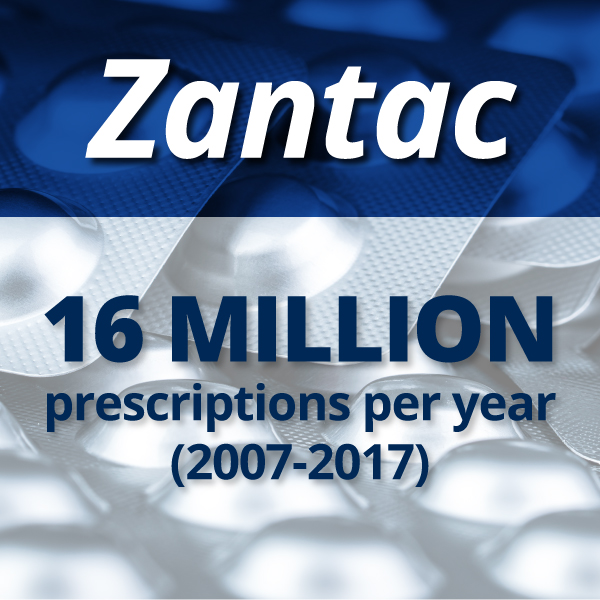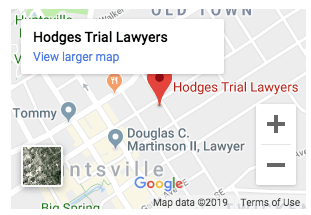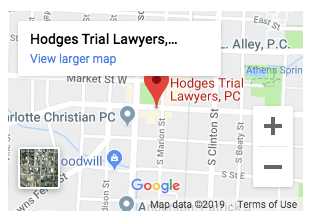Zantac
Available via prescription, as well as over the counter, Zantac has long been recommended by doctors for treating heartburn, sour stomach, and acid reflux. According to WebMD, more than 60 million Americans suffer from heartburn at least once a month, and as many as 15 million experience it every day.
Millions of consumers have used Zantac regularly over the past 40 years in part because it was relatively inexpensive. In April 2020, the Food and Drug Administration (FDA) requested all manufacturers to immediately withdraw all prescription and over the counter Zantac from the market after finding that it may contain unacceptably high levels of a dangerous carcinogen known as N-Nitrosodimethylamine (NDMA).
If you had been taking Zantac and are now experiencing symptoms of cancer, get in touch with the product liability lawyers at Hodges Trial Lawyers, P.C. today. Our legal team is closely following developments concerning the potential harm inflicted by this dangerous drug. We would be happy to share our knowledge with you and explore the possibility of filling a product liability claim.
What is Zantac?
Zantac is the brand name for the drug ranitidine, a histamine-2 blocker that decreases the amount of acid secreted by the stomach. Over the counter ranitidine is used to treat heartburn and gastroesophageal reflux disease (GERD), also known as acid reflux. Prescription strength ranitidine is used to prevent serious ulcers in the stomach and intestine. If left untreated, these ulcers can cause severe pain, discomfort, and internal bleeding.
Why is Zantac Considered Dangerous Today?
In the summer of 2019, an online pharmacy detected a link between Zantac and the carcinogen NDMA during routing batch testing. Shortly thereafter, the pharmacy filed a petition asking the FDA to recall all products containing ranitidine. Around that time, Stanford University also discovered that NDMA contamination of ranitidine was the result of the inherent instability of the ranitidine molecule. In other words, the basic generic chemical component of Zantac appeared to break down over time into the cancer-causing substance, NDMA. The research suggested that the longer Zantac sits on a shelf, the more likely it is to generate very high and dangerous levels of NDMA in the body, particularly if it is stored at higher temperatures.
What is NDMA?
NDMA is an organic compound that takes the form of yellow oil. It is composed of carbon, hydrogen, nitrogen, and oxygen, with the chemical formula (CH3)2NNO. It is classified by the Environmental Protection Agency as a B2 carcinogen, a category defined as carcinogenic to humans. NDMA has been widely studied and is known to cause cancer in animals, although studies involving humans have been limited. Previously used to make rocket fuel, NDMA is a byproduct of the manufacture of pesticides and tires. It is known to be toxic to the liver. The World Health Organization (WHO) has studied areas where water has been contaminated by NDMA.
The FDA’s acceptable daily intake limit of NDMA is 96 nanograms. The levels of NDMA far exceed that limit when ranitidine is mixed with gastric fluid and sodium nitrites of the type commonly found in the human digestive system.
NDMA Cancers and Symptoms
Animals exposed to low levels of NDMA for several weeks develop liver cancer, lung cancer, and non-cancerous liver damage. Pregnant animals were also found to give birth to stillborns. NDMA exposure has also been linked to stomach cancer, colon cancer, and rectal cancer, as well as kidney cancer, bladder cancer, esophageal cancer, and types of leukemia. If you or someone you know took Zantac previously, you should be on the alert for the following cancer symptoms:

If you experience any of these symptoms, consult your doctor. If you still have Zantac in your medicine cabinet, do not take it. Dispose of it according to the directions provided on the package. If you suffer from heartburn, other over the counter medicines that do not contain ranitidine are available, including Nexium, Prilosec, Tagamet, Prevacid, and Pepcid. To date, the FDA has not identified NDMA contamination in any of the alternative medicines. However, always consult your doctor for all medical advice. If your doctor advises you that you may have cancer symptoms due to previous use of Zantac, contact a product liability lawyer to determine if it is your best interest to file a claim to recover damages associated with your medical condition.
Timeline of FDA Actions Regarding Zantac
It is the responsibility of the FDA to ensure that medicines available to Americans are safe and effective. To that end, the agency investigates potential health risks. However, questions have been raised about the agency’s unwillingness to issue a Zantac recall in 2019, despite the evidence cited by Stanford University and the online pharmacy that first discovered the NDMA contamination in ranitidine, the generic form of Zantac. The timeline of the events involving NDMA contamination in Zantac include the following:
- June 2019: Online pharmacy Valisure discovers NDMA contamination in routine tests of batches of Zantac, which contain ranitidine
- July/August 2019: The FDA conducts laboratory tests and finds NDMA at low levels
- September 2019: The FDA warns the public of potential risks of Zantac and recommends that consumers consider alternative over the counter and prescription treatments, but does not issue a recall, saying that they could not determine how ranitidine becomes contaminated with NDMA
- September 2019: France and Canada recall Zantac and any medicines that contain ranitidine; Canada maintains that ranitidine itself breaks down and is the source of NDMA
- September 24, 2019: Manufacturer Sandoz issues the first voluntary recall of ranitidine capsules
- September 26, 2019: A voluntary recall was issued for over the counter ranitidine tablets manufactured by Apotex Corp. and labeled and sold by Walgreens, Walmart, and Rite-Aid
- October 2019: Pharmaceutical firm Sanofi voluntarily recalled over the counter products Zantac 150 and Zantac 75
- October 2019: More voluntary recalls were announced by Lannett Company, Novitium Pharma
- November and December 2019: Eight additional recalls of ranitidine products were announced
- January 2020: The FDA had announced that Appco Pharma, LLC voluntarily recalled prescription ranitidine capsules and Northwind Pharmaceuticals voluntarily recalled ranitidine tablets manufactured by Glenmark; at that time, CVS offered refunds to customers who had recently purchased Zantac or another ranitidine product
- April 2020: The FDA requests all manufacturers to remove Zantac and ranitidine products from the market
The recent FDA testing confirmed that NDMA levels increase in ranitidine, even under normal storage conditions. The testing also revealed that levels of NDMA increased as the product aged on the shelf. One reason for the discrepancy in the FDA’s various rounds of testing was that it was using two different methods, one of which more closely mimicked conditions in the human body.
The FDA stated that it will continue its review, surveillance, and compliance efforts regarding Zantac and ranitidine. Consumers can report adverse reactions or quality problems with any human drugs to the agency’s MedWatch Adverse Event Reporting Program.
Widespread Use of Zantac Prior to the Recall
It is important for consumers to understand that products are recalled because they pose a serious threat to public health. Drug manufacturers may issue voluntary recalls of dangerous products because they are aware of their liability. Distributors such as CVS, Walgreens, and Rite-Aid may also voluntarily recall products at any time. Regardless if the FDA mandates the recall or it is voluntary, the agency will monitor the outcome. The recall of Zantac may have alarming consequences because it had been one of the mostly widely prescribed drugs in America since 1981. Between 2007 and 2017, approximately 16 million prescriptions for Zantac were written each year.

Other Recalls Associated with NDMA
Since 2018, the FDA has been investigating the presence of NDMA in blood pressure medicines. The agency discovered that Angiotensin II Receptor Blockers, such as Losartan, Irbesartan, and Valsartan, contain unacceptable levels of NDMA. However, at this time, the FDA is stating that the risk of developing cancer is relatively low. According to their estimates, there would be only one additional cancer case from a group of 8,000 people taking the highest dose of the recalled Valsartan daily for four years.
Should I File a Claim If I Used Zantac and Now Have Cancer?
If you discovered symptoms of cancer that may be attributed to your past use of Zantac or other heartburn medicine containing ranitidine, you may have a legitimate product liability claim. Seek medical attention and make sure your cancerous condition is treated and thoroughly documented. Then, contact a lawyer you trust who has experience handling cases involving defective drugs and medical devices. A skilled product liability lawyer can evaluate your situation in light of similar claims and advise you regarding the process of filing a claim.
Drug-Based Product Liability Claims
Drug-based product liability claims have special features and are therefore different than personal injury claims involving other types of defective products. Drug-related product liability claims fall into three basic categories:
- Manufacturer defect
- Dangerous side effects
- Improperly marketed
A drug-related product liability claim may cite two or all three of these areas. No matter what categories are used, the plaintiff must be able to prove that they suffered harm, and that the use of the defective drug contributed to their injury.
Manufacturer Defect
Pharmaceutical drugs can be shown to have a manufacturing defect if they become contaminated at the manufacturing facility or were or otherwise improperly manufactured. It may also happen at the pharmacy where the drug was compounded or bottled. Contamination may also occur during shipping. A manufacturing defect can happen at any point between the factory and the point where the consumer purchases or otherwise receives the drug.
Side Effects
Drugs may be shown to be defective, even if they were properly manufactured, if they cause side effects that result in injury. In a number of cases, drugs have been in use for a very long time before serious side effects were discovered. In the most egregious cases, manufacturers were aware of the risks of serious side effects, but concealed the information from the public to make larger profits. Victims who are able to prove deception and concealment may be able to convince a jury to award high sums of money for punitive damages to punish the manufacturer and deter deceptive practices in the future.
Improper Marketing
All pharmaceutical drugs come with instructions, warnings, and recommendations for consumers. A drug may be improperly marketed if the manufacturer failed to include adequate warnings and instructions about dangerous side effects or safe use of the product. Other parties besides the manufacturer may also be found liable for improper marketing if they provided bad advice or deceptive advertising, including doctors, pharmacists, sales representatives from pharmaceutical firms, or other parties involved in the sale and distribution of the drug.
It is easy to see how a claim may involve more than one category. For example, a plaintiff may file a complaint concerning a drug’s dangerous side effect, as well as improper marketing due to failure to warn about that side effect.
Who is Liable for Injuries Caused by a Defective Drug?
There are many different parties involved in bringing a drug to market and getting it into the hands of the consumer. Any or all of these parties may be held liable for injuries caused by the drug that they made, sold, distributed, prescribed, or represented. The involvement of multiple parties is one reason why drug liability claims can become very complex. However, it is critical to identify potentially liable parties to obtain maximum compensation. The defendants bear collective responsibility for paying compensation if it is determined that the defective drug contributed to the injuries suffered by the plaintiff.
Identifying Potential Defendants
Each person or entity in a drug’s chain of distribution is a potential defendant in a defective drug case. The list includes the following:
- Manufacturer: There are substantial technical and regulatory challenges in bringing a drug to market, but there are tremendous potential profits to be made as well. As a result, drug manufacturers are usually large companies with deep pockets. If you are considering a claim against a manufacturer, be aware that they will have an army of sophisticated lawyers defending their actions.
- Pharmaceutical sales representatives: Sales representatives from drug companies meet with physicians and other members of the medical community to hype their products and offer recommendations regarding usage. Pharmaceutical representatives also make presentations at medical conferences and may be liable if their recommendations or characterizations misled doctors into wrongly prescribing a drug that caused injury.
- Testing laboratory:All pharmaceutical drugs must undergo rigorous tests. However, a testing laboratory may have produced inaccurate results or summaries, and hence be held liable for misrepresenting a drug that caused harm.
- Doctors and hospitals:Physicians who prescribe a defective drug are also part of the chain of distribution and may be held liable if they failed to warn a patient about serious side effects, or if they did not take the time to adequately explain how to safely use the product.
- Pharmacy: A pharmacy is typically where the consumer obtains the drug. Many times, consumers ask their pharmacist for advice regarding safe usage and side effects of the medicines they are purchasing.
Consumers in America would like to believe that the drugs they use to treat their medical conditions are safe and effective. However, large manufacturers and other entities in the chain of distribution may be tempted to take shortcuts to boost profits.
Huntsville Product Liability Lawyers at Hodges Trial Lawyers, P.C. Advocate for Consumers Harmed by Defective Drugs
If you believe you were harmed by Zantac or any other defective drug, contact the Huntsville product liability lawyers at Hodges Trial Lawyers, P.C. as soon as possible. We will carefully evaluate your claim and advise you regarding compensation for damages. For an initial consultation, fill out our online form or call us at 938-333-3464. We are proud to serve clients across North Alabama, Madison County, Limestone County, Marshall County, Jackson County, Morgan County, and Lauderdale County from our offices conveniently located in Huntsville and Athens, Alabama.



